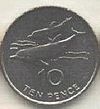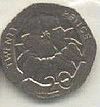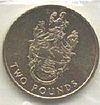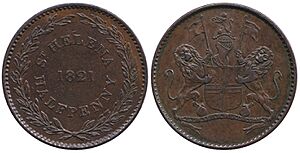Saint Helena pound facts for kids
Quick facts for kids Saint Helena pound |
|
|---|---|
| ISO 4217 Code | SHP |
| User(s) | |
| Inflation | 3.2% |
| Source | The World Factbook, 1997 est. |
| Pegged with | sterling at par |
| Subunit | |
| 1⁄100 | penny |
| Symbol | £ |
| Plural | |
| penny | pence |
| Coins | 1, 2, 5, 10, 20, 50 pence, £1, £2 |
| Banknotes | £5, £10, £20 |
The Saint Helena pound is the money used on the islands of Saint Helena and Ascension Island. These islands are part of a larger area called the British Overseas Territory of Saint Helena, Ascension and Tristan da Cunha.
The Saint Helena pound is worth the same as the British pound. This means you can use both currencies on Saint Helena. One Saint Helena pound is made up of 100 pence.
Tristan da Cunha, the third part of the territory, mainly uses the British pound. However, special collector coins are sometimes made for Tristan da Cunha.
Contents
History of the Saint Helena Pound
Early Money on the Islands
For a long time, the islands used British money, called sterling. This money was based on a "pound" which had 20 "shillings," and each shilling had 12 "pence."
Sometimes, the island also printed its own paper money. In 1821, a special copper halfpenny coin was made just for Saint Helena. This coin was used along with the British coins. The local paper money was also worth the same as British sterling.
Before 1961, the South African pound was also accepted on the island. It was worth the same as the British pound back then. But when South Africa changed its money to the South African rand, the rand was worth less, so it was no longer used on Saint Helena.
New Currency for Saint Helena
Until 1976, Saint Helena mostly used British money. But in February 1976, the Saint Helena Government created a special board to handle money. This board started printing new paper money, called banknotes, for the island. These new banknotes were worth the same as British pounds.
In 1984, coins were made specifically for Saint Helena and Ascension Island. These coins and banknotes were also later used on Tristan da Cunha. The coins say "Saint Helena • Ascension" on them. However, the banknotes only say "Government of St. Helena."
Coins of Saint Helena
The copper halfpenny coin from 1821 was made for Saint Helena by the East India Company. This company was involved with the island for a long time. During this period, famous people like Napoleon Bonaparte were held on the island. After this, no new coins were made for Saint Helena for 163 years, until 1984.
Before 1984, Saint Helena and Ascension Island did make special collector coins. But for everyday use, they used regular British coins. The Saint Helena banknotes were used alongside British coins and banknotes.
Modern Coins and Designs
In 1984, new coins were introduced for Saint Helena and Ascension. These coins came in values of 1, 2, 5, 10, and 50 pence, and £1. A coin designer named Michael Hibbit created these coins.
All the Saint Helena coins are the same size and are made of the same materials as the British coins. They also have the same value. Each coin shows different plants and animals that are special to the islands. These coins are also used on Tristan da Cunha, along with British money.
On one side of all the circulating coins, you can see a picture of Queen Elizabeth II. This side is called the obverse. It also says "Queen Elizabeth II," "St. Helena • Ascension," and the year the coin was made.
Some of the designs on the other side of the coins (called the reverse) have changed over time. For example, the 5-pence coins made before 1998 showed the Saint Helena plover, which is a bird special to the island. The 10-pence coins before 1998 showed orchids.
Here are the current designs you can find on the coins:
| £0.01 | £0.02 | £0.05 |
|---|---|---|
 |
 |
 |
| Tuna fish | Donkey carrying firewood | Jonathan the tortoise |
| £0.10 | £0.20 | £0.50 |
 |
 |
 |
| Dolphin | Ebony plant | Green sea turtle |
| £1.00 | £2.00 | |
 |
 |
|
| Sooty tern bird | Coat of arms of Saint Helena |
In 1998, new 20-pence coins were introduced. Also, older 5- and 10-pence coins were replaced with smaller ones that had new animal designs. The 50-pence coin became smaller in 2003. In 2002, £1 coins were introduced to replace the £1 banknote. The next year, two-metal £2 coins were also introduced.
Banknotes of Saint Helena
Saint Helena has a long history of printing its own paper money, called banknotes.
Early Banknotes
Starting in 1716, the "Governor and Council of the Island of St Helena" printed banknotes. These were for values like 2 shillings and 6 pence, 5 shillings, £1, and £2. They continued to print these until the late 1700s.
Later, after 1917, the "St Helena Currency Board" printed notes for 5 shillings, 20 shillings, and 40 shillings.
Modern Banknotes
In 1976, the Government of Saint Helena's currency board started printing £1 and £5 banknotes. In 1979, they added 50p and £10 notes.
The 50p and £1 notes were later replaced by coins in 1984. In 1986, £20 notes were introduced for the first time. The £5 note was redesigned in 1988.
In 2004, new £10 and £20 notes were released. These new notes were made by a company called De La Rue and had new designs and better security features to prevent fake money. When these new notes came out, the £1 note was stopped and taken out of use.
How the Saint Helena Pound is Used
The only bank on Saint Helena and Ascension Island is the Bank of Saint Helena. When you get money from this bank, you receive Saint Helena pounds.
If you need to send money to other countries, or if visitors use credit cards on the island, the money is usually changed into British pounds, euros, South African rand, or United States dollars. This means that the Saint Helena pound is mainly used on the islands themselves and not for international transfers.
Exchange Rates
The Bank of St Helena shares the exchange rates for its currency. The Saint Helena pound is always worth the same as the British pound (1:1). However, there might be small fees for exchanging or transferring money.
You can also find out how much the Saint Helena pound is worth compared to other currencies, like the US dollar:
| Current SHP exchange rates | |
|---|---|
| From Google Finance: | AUD CAD CHF EUR GBP HKD JPY USD USD |
| From Yahoo! Finance: | AUD CAD CHF EUR GBP HKD JPY USD USD |
| From XE.com: | AUD CAD CHF EUR GBP HKD JPY USD USD |
| From OANDA: | AUD CAD CHF EUR GBP HKD JPY USD USD |
| From fxtop.com: | AUD CAD CHF EUR GBP HKD JPY USD USD |
See also
- Bank of St Helena
- Economy of Saint Helena
 | Isaac Myers |
 | D. Hamilton Jackson |
 | A. Philip Randolph |


